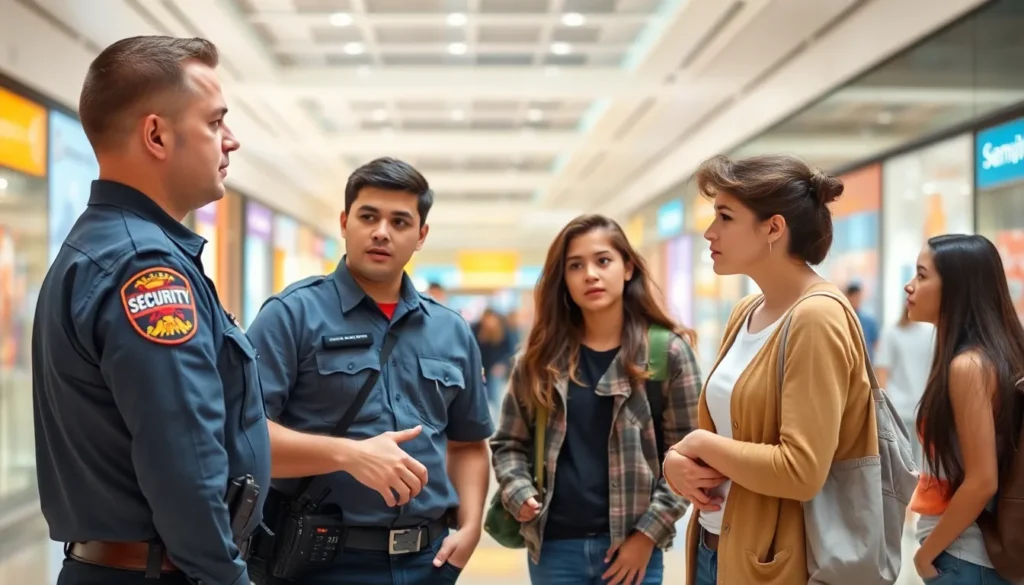Table of Contents
ToggleEver found yourself wondering if that stern-looking security guard could actually detain you? Picture this: you’re just trying to enjoy a day at the mall when suddenly a security guard swoops in like a superhero, ready to save the day—or at least keep you from snatching that last slice of pizza. But can they really hold you against your will?
Understanding Security Guard Authority
Security guards possess specific authority within their roles, particularly in settings like malls or events. Understanding their power helps clarify situations where they may intervene.
Definition of a Security Guard
A security guard is a trained professional responsible for protecting property, assets, and individuals. Duties often include monitoring premises, preventing theft, and responding to emergencies. Security guards work in various locations, from retail spaces to corporate establishments. Their training equips them to observe and report incidents effectively. Many security guards undergo background checks, ensuring a degree of trustworthiness. Compliance with local laws often defines their procedures and responsibilities.
Legal Basis for Detention
Legal authority for security guards to detain individuals varies by jurisdiction. Many states allow security personnel to make a citizen’s arrest when witnessing a crime. Timing plays a crucial role, as immediate action is generally required for lawful detainment. The objective must be to prevent further criminal activity or protect others. Inappropriately detaining someone can lead to legal repercussions for the guard and their employer. Understanding the laws governing detainment helps clarify the accepted practices of security personnel.
When Can Security Guards Detain You?

Security guards can detain individuals under specific circumstances. Understanding these conditions clarifies their authority and limitations.
Reasonable Suspicion vs. Probable Cause
Reasonable suspicion involves a belief based on specific facts that a person is engaged in criminal activity. Security guards operate under this standard more frequently, allowing them to act quickly in uncertain situations. Probable cause indicates a stronger basis for belief that a crime has occurred. While security personnel often lack the authority to arrest, they can detain someone briefly if they have reasonable suspicion. Detainment for longer periods typically requires probable cause. Case law demonstrates that failing to understand these distinctions can result in legal issues for security guards.
Types of Situations Allowing Detainment
Specific situations warrant detainment by security guards. Observing theft clearly empowers guards to intervene immediately. Suspected drug use or dealing can also justify detention, particularly in a retail or public setting. Potential threats to safety, like aggressive behavior, allow security guards to take necessary actions. In instances of trespassing, guards often detain individuals until law enforcement arrives. Training emphasizes acting within legal bounds and preserving security for everyone involved. Each scenario carries its own nuances that affect how security personnel can proceed.
Rights of Individuals During Detention
Individuals subjected to detention by security guards possess specific rights that protect them from unlawful treatment. Understanding these rights proves valuable in navigating such situations.
Your Rights as a Detainee
Individuals have the right to know the reason for their detention. Security personnel must provide a clear explanation if they hold someone. Legal representation remains a detainee’s right; individuals can ask for a lawyer at any point during the process. Respectful treatment is required. Detainees should not face physical intimidation, harassment, or discrimination while in custody. Additionally, individuals can request to contact family or friends to inform them of their situation. Knowing these rights helps individuals assert themselves effectively when detained.
How to Respond to Detention
Staying calm during detention is essential for individuals. Reacting with aggression may escalate tensions and worsen the situation. Asking the guard directly about the reason for detention provides clarity. It’s wise to comply with reasonable requests, such as producing identification, to avoid further complications. Individuals should document the incident afterward by noting details and witnesses. Contacting law enforcement or a legal representative promptly ensures that rights remain protected. Keeping communication respectful improves the chances of a more favorable resolution.
Limitations of Security Guard Detention
Understanding the limitations of security guard detention clarifies when they can act and the potential consequences of their actions.
Use of Force and Legal Implications
Security guards may use reasonable force to detain individuals if necessary. The level of force must align with the specific situation. Any excessive force can lead to legal consequences for both the guard and their employer. They should stick to methods that ensure safety without causing injury. Jurisdictional laws often define what is deemed reasonable. Knowing these laws helps guards operate within their authority while maintaining proper conduct during a detainment.
Duration of Detention
Detention must occur for a limited time to comply with legal standards. An immediate investigation often dictates the length of the detention. In most cases, authorities advise that detention should last only until law enforcement arrives or the situation resolves. Guards must avoid holding individuals longer than necessary, as prolonged detention can lead to legal liabilities. Understanding these timeframes is essential for both security personnel and individuals involved, ensuring their rights are protected throughout.
Security guards play a vital role in maintaining safety and order in various environments. Their authority to detain individuals is guided by specific laws and regulations that vary by jurisdiction. Understanding these legal parameters is crucial for both security personnel and the public.
Individuals should be aware of their rights during any encounter with security guards. Remaining calm and informed can help navigate these situations effectively. By recognizing the limits of a guard’s authority and the appropriate actions to take, everyone can contribute to a safer environment while ensuring their rights are respected.




